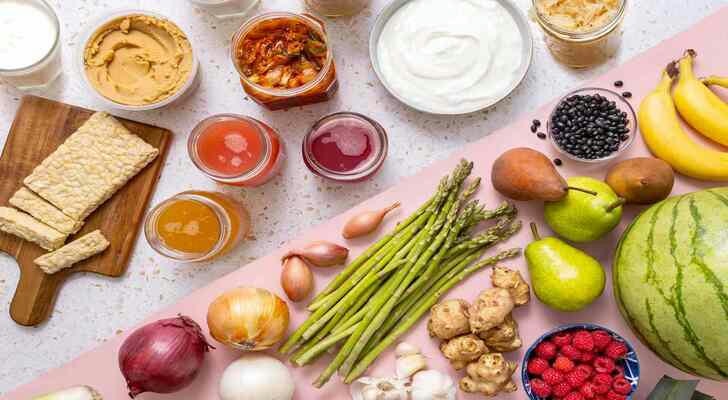12 Probiotic Foods to Eat for a Healthy Gut
Maintaining a healthy gut is essential for overall well-being, and one of the most effective ways to support gut health is by incorporating probiotic-rich foods into your diet 🍎. Probiotics are live microorganisms that promote a healthy balance of gut bacteria, which is crucial for digestion, immune function, and even mental health 🧠. In this article, it’ll explore 12 probiotic foods that can help you achieve a healthier gut, backed by scientific research and data! 🎉

1. Yogurt (with Live and Active Cultures) 🍿
Yogurt is one of the most well-known probiotic foods 🍿. It contains strains like Lactobacillus bulgaricus and Streptococcus thermophilus, which are added during fermentation. A single serving of yogurt can provide up to 1 billion CFU (colony-forming units) of probiotics 🧬. Studies have shown that consuming yogurt regularly can improve digestion and reduce symptoms of irritable bowel syndrome (IBS) 🩺.
User Example: Sarah, a busy office worker, eats a cup of Greek yogurt with berries every morning to kickstart her day with a happy gut! 🍓✨
2. Kefir 🥛
Kefir is a fermented milk drink that contains a diverse range of probiotic bacteria, including Lactobacillus acidophilus and Bifidobacterium bifidum 🧪. It has been shown to improve lactose tolerance and reduce inflammation in the gut 🥛. A 2019 study found that kefir can even help regulate the gut microbiota in individuals with diabetes 📊.
User Example: Mark, a fitness enthusiast, drinks a glass of kefir after his workouts to support his gut and muscle recovery 🏋️♂️💪.
3. Sauerkraut 🥦
Sauerkraut is a fermented cabbage dish that is rich in Lactobacillus plantarum 🥦. It is not only a great source of probiotics but also high in vitamins C and K 🧴. A 2018 study revealed that sauerkraut contains up to 1.5 billion CFU per serving, making it a potent probiotic food 💪.
User Example: Emily, a health-conscious mom, adds sauerkraut to her family’s salads for a tangy, gut-friendly twist! 🥗👨👩👧👦
4. Kimchi 🌶️
Kimchi, a traditional Korean fermented vegetable dish, is packed with probiotics like Lactobacillus and Bifidobacterium 🌶️. It is also high in antioxidants and vitamins 🧪. Research has shown that kimchi can improve gut health and even help with weight management ⚖️.
User Example: James, a foodie, loves adding spicy kimchi to his meals for a flavor boost and a healthier gut! 🍲🔥
5. Miso 🍜
Miso is a fermented soybean paste that is commonly used in Japanese cuisine 🍜. It contains probiotics like Aspergillus oryzae and Lactobacillus plantarum 🧪. A 2017 study found that miso can help reduce inflammation and improve gut barrier function 🩸.
User Example: Rachel, a sushi lover, uses miso soup as a comforting and gut-friendly start to her meals 🍜🍜.
6. Tempeh 🌱
Tempeh is a fermented soybean product that is rich in probiotics like Rhizopus oligosporus 🌱. It is also a great source of plant-based protein and vitamins 💪. Studies have shown that tempeh can improve gut health and reduce cholesterol levels 🩺.
User Example: Vegan Alex incorporates tempeh into her stir-fries for a protein-packed, gut-friendly meal! 🥦🍲
7. Kombucha 🍹
Kombucha is a fermented tea drink that contains a variety of probiotic bacteria, including Glucobacterium and Acetobacter 🍹. It is also rich in antioxidants and has been shown to improve gut health and boost the immune system 🧪.
User Example: David, a college student, sips on kombucha during exams to stay energized and focused! 📚💡
8. Pickles 🥒
Pickles, especially those made through lactic acid fermentation, are a great source of probiotics like Lactobacillus plantarum 🥒. They are also low in calories and high in vitamins 🥗. A 2014 study found that pickles can improve gut health and reduce symptoms of IBS 🩺.
User Example: Lisa, a sandwich lover, adds pickles to her lunch for a crunchy, probiotic-packed snack! 🥪🥒
9. Natto 🍢
Natto is a traditional Japanese dish made from fermented soybeans 🍢. It is rich in probiotics like Bacillus subtilis and is also a great source of vitamin K2 💪. Studies have shown that natto can improve gut health and reduce the risk of cardiovascular diseases ❤️.
User Example: Tom, a sushi enthusiast, enjoys natto over rice for a unique and gut-friendly breakfast! 🍚🍜
10. Cheese 🧀
Certain types of cheese, such as cheddar, mozzarella, and feta, contain probiotics like Lactobacillus acidophilus and Bifidobacterium bifidum 🧀. A 2018 study found that cheese can improve gut health and reduce inflammation in the body 🩺.
User Example: Claire, a cheese lover, snacks on feta and crackers to satisfy her cravings while supporting her gut! 🧀👌
11. Buttermilk 🥛
Buttermilk is a fermented dairy drink that contains probiotics like Lactobacillus acidophilus 🥛. It is also low in fat and high in calcium 🧴. Studies have shown that buttermilk can improve digestion and reduce symptoms of IBS 🩺.
User Example: Michael, a smoothie fan, blends buttermilk with fruits for a creamy, gut-friendly smoothie! 🍓🥛
12. Apple Cider Vinegar 🍎
Apple cider vinegar is a fermented drink that contains probiotics like Acetobacterium and Lactobacillus 🍎. It is also rich in antioxidants and has been shown to improve gut health and reduce blood sugar levels 🩸.
User Example: Jessica, a wellness blogger, mixes apple cider vinegar with water as a refreshing morning tonic! 🍋✨
Conclusion 🌟
Incorporating these 12 probiotic foods into your diet can have a significant impact on your gut health 🌱. From yogurt and kefir to sauerkraut and kimchi, there are plenty of delicious and nutritious options to choose from 🍲. Remember to always opt for products that contain live and active cultures, as they are the ones that provide the most benefits 💡. With a little creativity and planning, you can easily make these foods a part of your daily meals and enjoy the rewards of a healthy gut 🥑.
So, which probiotic food will you add to your diet first?
